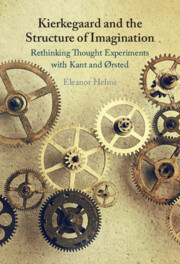Book contents
- Kierkegaard and the Structure of Imagination
- Kierkegaard and the Structure of Imagination
- Copyright page
- Contents
- Acknowledgments
- Abbreviations
- Introduction
- Part I The Origins of “Thought Experiment” in Kant and Ørsted
- Part II A Kantian Account of Thought Experiment
- Chapter 6 Varieties of Cognition
- Chapter 7 An Apparatus for Cognition
- Chapter 8 Cognizing Regulative Ideas
- Chapter 9 Bizarre Cases and Context
- Part III Kierkegaard and the Concept of Thought Experiment
- Conclusion
- Bibliography
- Index
Chapter 9 - Bizarre Cases and Context
Two Problems for Thought Experiments
from Part II - A Kantian Account of Thought Experiment
Published online by Cambridge University Press: 26 September 2025
- Kierkegaard and the Structure of Imagination
- Kierkegaard and the Structure of Imagination
- Copyright page
- Contents
- Acknowledgments
- Abbreviations
- Introduction
- Part I The Origins of “Thought Experiment” in Kant and Ørsted
- Part II A Kantian Account of Thought Experiment
- Chapter 6 Varieties of Cognition
- Chapter 7 An Apparatus for Cognition
- Chapter 8 Cognizing Regulative Ideas
- Chapter 9 Bizarre Cases and Context
- Part III Kierkegaard and the Concept of Thought Experiment
- Conclusion
- Bibliography
- Index
Summary
Kant’s distinction between different uses of judgments – determining and reflecting – sheds light on two areas of recent debates about thought experiments as a method: (1) the question of bizarre cases and (2) the problem of missing context. On the question of bizarre cases, I show how a Kantian explains why it is sometimes acceptable for thought experiments to be far-fetched. For philosophical problems that call for reflecting judgment (i.e., the creation or discovery of new concepts), bizarre cases can be particularly effective. The problem of bizarre cases is closely related to the problem of missing context, which is another common objection to their use. The problem is that readers are often left to fill in background context that might be relevant for how they evaluate the thought experiment scenario. I will argue that missing context is a problem only if readers evaluate scenarios based on their prior knowledge and familiar experience. If instead, as I claim, the fictional case makes a new presentation possible, the additional context may be irrelevant and might distract from the presentation the thought experiment is designed to recreate.
Keywords
Information
- Type
- Chapter
- Information
- Kierkegaard and the Structure of ImaginationRethinking Thought Experiments with Kant and Ørsted, pp. 138 - 154Publisher: Cambridge University PressPrint publication year: 2025
Accessibility standard: Inaccessible, or known limited accessibility
Why this information is here
This section outlines the accessibility features of this content - including support for screen readers, full keyboard navigation and high-contrast display options. This may not be relevant for you.Accessibility Information
Content Navigation
Allows you to navigate directly to chapters, sections, or non‐text items through a linked table of contents, reducing the need for extensive scrolling.
Provides an interactive index, letting you go straight to where a term or subject appears in the text without manual searching.
Reading Order & Textual Equivalents
You will encounter all content (including footnotes, captions, etc.) in a clear, sequential flow, making it easier to follow with assistive tools like screen readers.
You get more than just short alt text: you have comprehensive text equivalents, transcripts, captions, or audio descriptions for substantial non‐text content, which is especially helpful for complex visuals or multimedia.
Visual Accessibility
You will still understand key ideas or prompts without relying solely on colour, which is especially helpful if you have colour vision deficiencies.
You benefit from high‐contrast text, which improves legibility if you have low vision or if you are reading in less‐than‐ideal lighting conditions.
